SEO Service
Our SEO service helps your website rank higher on Google and makes it easier for potential customers to find you.
Our SEO services include on-page SEO, off-page SEO, technical SEO, local SEO, e-commerce SEO, content marketing, and SEO audits.

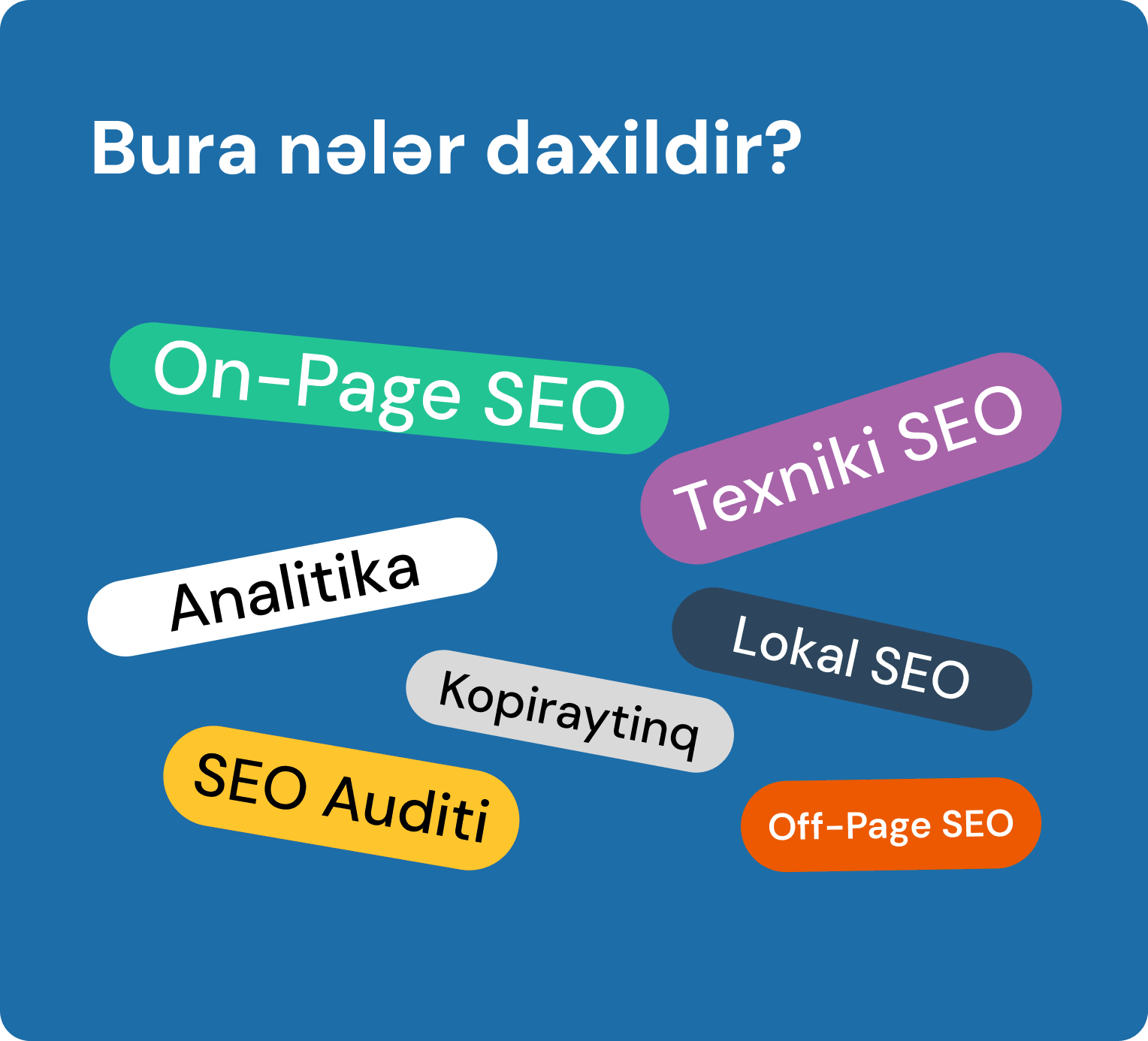
What Is SEO Service?
SEO is the process of ensuring that your website ranks higher in search engines like Google. In Azerbaijani, it is translated as Search Engine Optimization.
But SEO is not just about climbing to the top positions. The main goal is to attract the right audience through organic traffic.
In short, SEO ensures that your website appears when potential customers are searching for what you offer.
SEO optimizes both the technical and content aspects of your site so that search engines can better understand it.
It acts as a bridge between what people are searching for and what you provide.
Professional SEO services increase your website’s authority, improve user experience, and ensure sustainable long-term growth. Unlike paid ads, SEO is an investment that becomes more valuable over time.
Why Is SEO Important?
In modern digital marketing, the importance of SEO cannot be overstated. This strategy directly affects your online visibility.
Every second, thousands of people search for products, services, or information. If your website doesn’t appear in those results, you’re missing out on potential customers.
What makes SEO unique is its ability to attract the exact audience you need. People are already searching for the products or services you offer. This means higher-quality traffic, better conversion rates, and lower advertising costs.
A strong SEO strategy ensures your website ranks higher on search engines like Google.
According to statistics, the first organic result is 10 times more likely to get clicks compared to a page in the 10th position.
Beyond traffic, SEO builds trust and authority. When your website ranks high, users perceive your brand as more professional and reliable.
Website speed, responsiveness, internal linking, and user experience are also essential components of the SEO process.
If your goal is to increase ROI, improve KPI performance, and build long-term brand value, SEO is the right service for you.
SEO is not just about ranking higher in search engines — it’s also about improving the overall user experience and strengthening your brand presence.
SEO vs PPC: Which Is More Effective?
In digital marketing, two core strategies are often compared: SEO and PPC. Both aim to drive traffic — one through organic search, the other through paid advertising.
The goal is the same: getting your website in front of potential customers. However, these two approaches work very differently and each has its own advantages.
SEO is used to rank your website higher in search results organically. It builds long-term trust with users and delivers sustainable results.
SEO includes on-page optimization, technical SEO, content marketing, backlink building, and more. Over time, these methods generate steady traffic without requiring direct ad spend.
On the other hand, PPC provides instant traffic. You bid on chosen keywords, and each time a user clicks your ad, you pay.
PPC is ideal for short-term campaigns or businesses seeking quick results. But once the campaign stops, so does the traffic.
The main differences are cost and sustainability. SEO takes time but delivers higher ROI and long-lasting results. PPC brings immediate results but requires ongoing spend and a higher budget.
The most effective strategy is usually a combination of both. Instead of choosing one over the other, it’s best to integrate SEO and PPC into your digital marketing strategy and use each where it fits best.
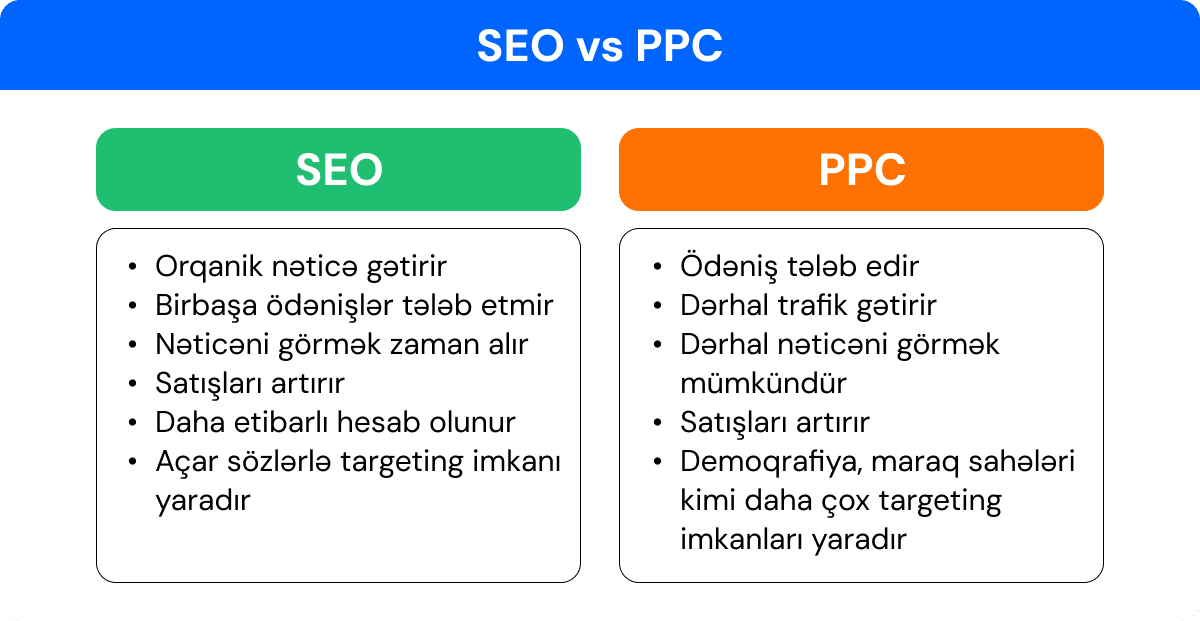
How Does SEO Work?
To understand SEO, you first need to look at how it works in practice. SEO operates in three main stages: Crawling, Indexing, and Ranking.
1. Crawling: Search engines discover your site
The first stage of SEO is called crawling, which means search engines explore and discover your site.
Search engines like Google use bots (or crawlers) to scan your pages, follow links, and analyze technical structure. These bots review your HTML code, content, meta tags, image alt texts, URLs, sitemaps, and robots.txt files.
If there are technical errors or broken links, crawlers may not see all your content, which prevents indexing and ranking.
For effective crawling, your website should have:
- A proper and logical site structure
- An updated and submitted sitemap
- No broken links or “404” errors
- Well-placed internal links
- Optimized loading speed and technical performance
Without proper crawling, your content may remain invisible to Google. That’s why strong technical SEO is the foundation of successful optimization.
2. Indexing: Search Engines Store Your Pages
Once crawling is successful, the next step is indexing — when search engines save your pages in their database.
During indexing, Google analyzes your titles, keyword usage, meta descriptions, URLs, content quality, and structure.
Only indexed pages can appear in search results. Duplicate content, weak HTML structure, or noindex tags can block indexing.
To ensure proper indexing:
- Content must be unique, valuable, and well-structured
- Technical issues (like missing canonical tags or redirects) must be fixed
- Schema markup should be used to help search engines understand content better
- Google Search Console should be used to monitor indexing status
If a page isn’t indexed, it’s invisible to search engines and users.
3. Ranking: Search Engines Evaluate Your Page
The final stage is ranking — deciding where your page appears in search results.
Google uses algorithms to evaluate pages and show the most relevant and valuable ones to users. Ranking decisions are based on hundreds of factors, including:
- Content relevance to the search query
- Content quality
- Domain authority and trustworthiness
- User experience (UX) and site performance
- Location and technical signals
To achieve higher rankings:
- Create content aligned with keywords and search intent
- Earn backlinks from trusted sites as external signals of authority
- Optimize responsiveness, speed, and navigation
- Strengthen internal linking for better user experience
- Use title tags, meta descriptions, and structured headings properly
SEO services combine these elements to help your site stay competitive and achieve visibility in search results.
Key Elements of an SEO Strategy
A successful SEO strategy isn’t built on just one or two techniques. It’s a comprehensive approach that combines multiple elements working together.
Simply adding keywords or collecting backlinks isn’t enough to achieve real results.
It all starts with Technical SEO — ensuring your website is accessible, crawlable, and understandable for search engines. This includes site speed, responsiveness, clean coding, URL structure, sitemaps, and robots.txt optimization.
Next comes Content Marketing — creating valuable and targeted content that answers user questions, meets their needs, and differentiates you from competitors. Blog posts, service pages, and other formats help you gain both traffic and trust.
Then we move to On-page SEO — optimizing website content and structure with the right keywords, proper headings, meta descriptions, alt texts, and internal linking. Each page must be clear and valuable for both users and search engines.
Finally, Off-page SEO builds authority through external signals like backlinks, digital PR, and brand mentions. These tell Google your site is trustworthy and authoritative.
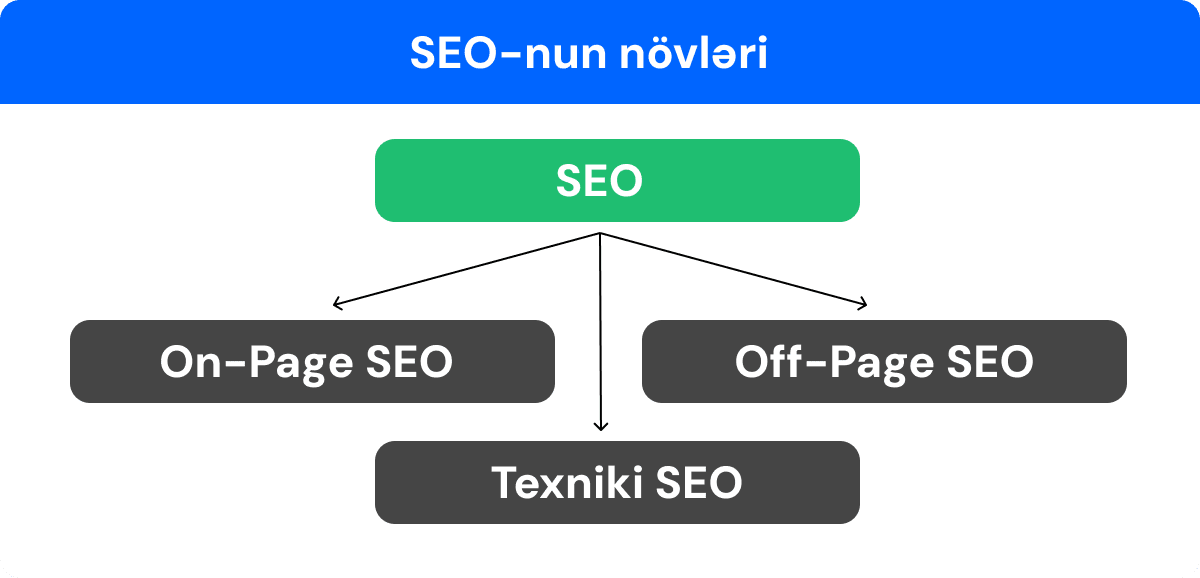
On-page SEO Services
On-page SEO focuses on optimizing all technical and content elements within your website.
It ensures search engines understand your pages better while improving user experience.
- Keywords are strategically placed in headings, text, meta descriptions, and alt tags.
- URLs remain clean and semantic.
- Images are optimized, and HTML structure is clear.
- Internal linking connects pages logically for smooth navigation.
In short, On-page SEO strengthens your site technically, semantically, and strategically. Without it, other SEO efforts cannot be fully effective.
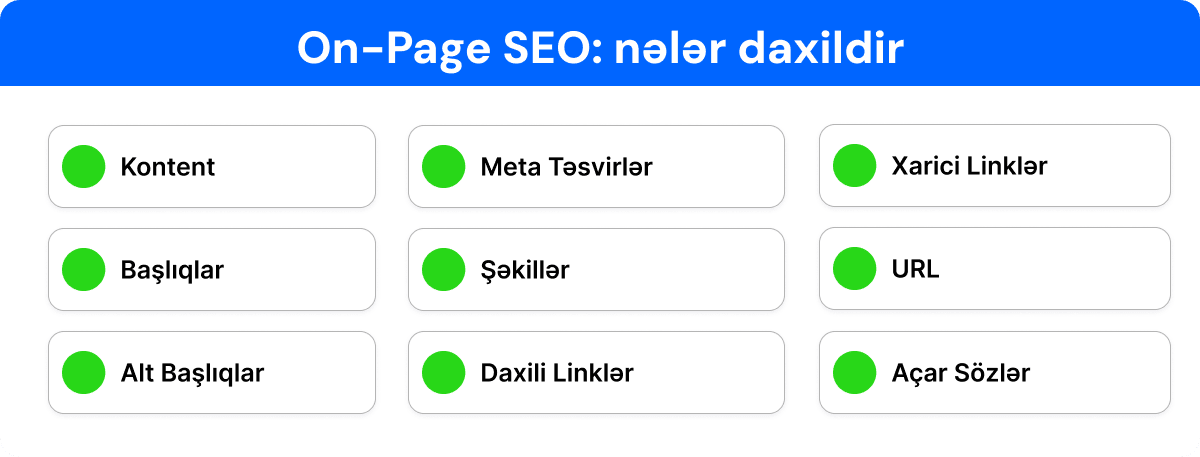
Off-page SEO Services
Off-page SEO strengthens your website’s authority and trustworthiness in the external digital space.
Its core element is backlinks — links from reputable websites that act as a “vote of confidence.” The more high-quality backlinks you have, the more reliable and relevant your site appears to search engines.
But off-page SEO is not just about link building. It also includes:
- Digital PR
- Guest posting
- Social media activity
- Managing online reviews and ratings
Anchor text diversity is also important — using the same anchor repeatedly may be seen as spam by Google.
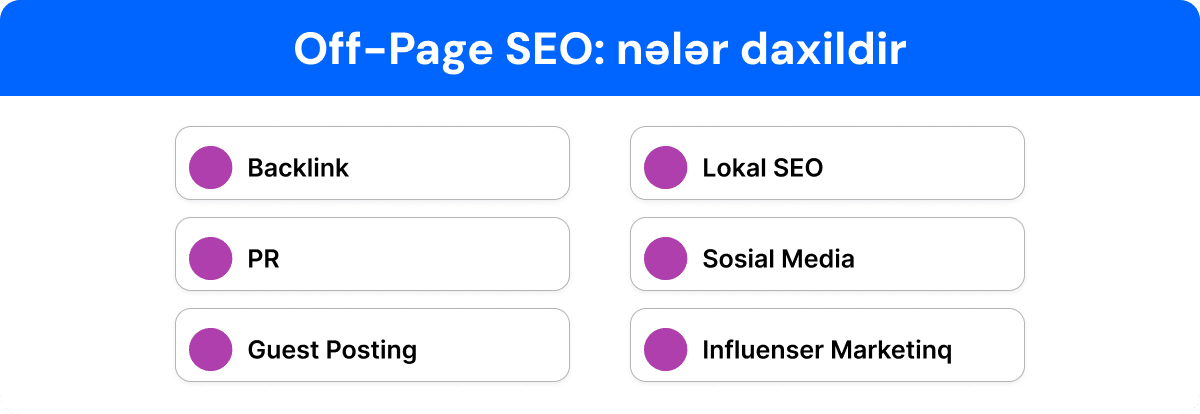
Technical SEO Services
Technical SEO ensures your website is crawlable, indexable, and high-performing for both users and search engines.
It involves:
- Fixing robots.txt and sitemap issues
- Optimizing site speed and server response time
- Cleaning up duplicate content and canonical tags
- Mobile optimization with Google’s mobile-first indexing
- Schema markup for structured data
- Improving overall UX/UI design
Technical SEO is like the safety belt of your entire SEO strategy — without it, even great content can fail to rank.
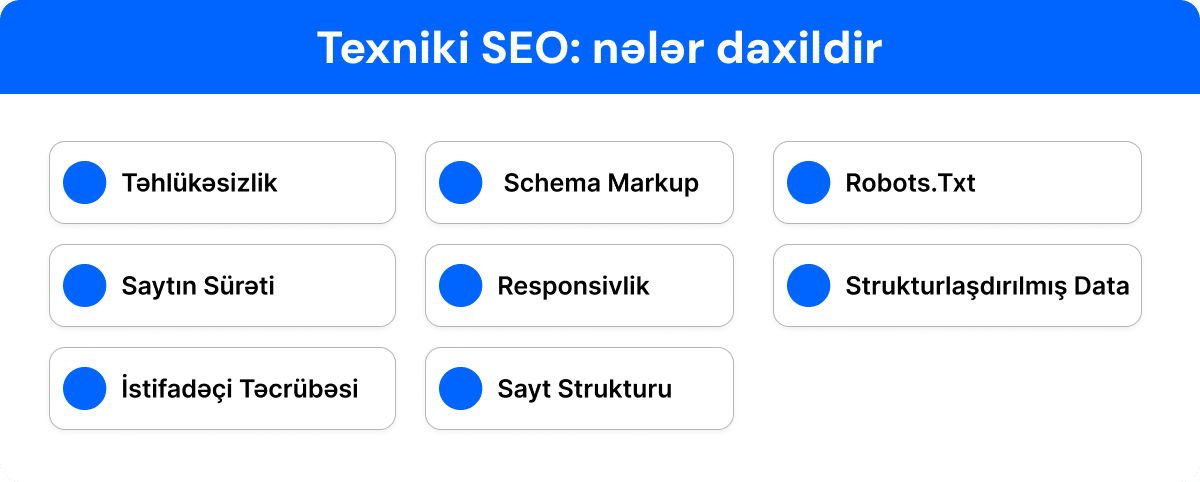
Local SEO Services
Local SEO helps your business appear in location-based searches, connecting you with nearby customers.
It starts with optimizing your Google Business Profile (business name, address, phone, hours, categories, and images). This boosts your visibility in Google Maps and local SERPs.
Local SEO also includes:
- Managing online reviews (positive reviews build trust and influence buyers)
- Creating localized content targeting keywords like “Dentist in Baku” or “Car repair in Sumqayit”
- Building trust signals through community engagement and responses to feedback
Done right, Local SEO turns your business into a trusted go-to option for local customers.
Content Marketing for SEO
Content marketing is at the heart of SEO, bridging user needs and search engine requirements.
It begins with thorough keyword research to understand what your audience is searching for and why. Based on this, you create optimized blogs, landing pages, and service pages that:
- Provide value to readers
- Answer their questions
- Boost visibility in search engines
Structured formatting, proper headings, internal linking, and semantic keywords make content more appealing for both users and Google.
E-commerce SEO Services
E-commerce SEO helps online stores make their products more visible in search results and drive more sales.
Unlike standard websites, e-commerce platforms face challenges like large product catalogs, frequent updates, and strong competition.
E-commerce SEO includes:
- Optimizing product pages with clear descriptions, keywords, and alt tags
- Structuring URLs logically
- Improving category and filter pages for better indexing
- Fixing duplicate content and canonical issues
- Driving conversions with optimized reviews, comparisons, and product guides
The result: more traffic that converts
SEO Audit Services
An SEO audit is a detailed evaluation of your site’s optimization and growth potential.
It checks:
- Technical issues
- Keyword usage
- Content quality
- Mobile responsiveness
- Speed optimization
- Backlink profile
Additionally, competitor strategies are analyzed to create a stronger SEO growth plan.
A well-executed SEO audit uncovers hidden issues, improves accessibility, and ensures your site remains competitive in search rankings.
Why Should You Get SEO Services?
SEO is not just about adding keywords or creating content.
An effective SEO strategy requires technical expertise, ongoing analysis, and constant adaptation to changing algorithms.
Professional SEO specialists ensure that your website is properly indexed by search engines and reaches your target audience through optimized strategies.
Trying to handle SEO alone is possible, but it often results in wasted time and resources.
With ever-changing algorithms, fixing technical issues, analyzing competitors, and building a sustainable content strategy require a professional approach.
Conclusion
SEO is essential for achieving long-term success in digital marketing.
It transforms your website into a 24/7 sales machine, helping you reach the right audience, generate organic traffic, and increase conversions with a consistent strategy.
If your goal is to “rank #1 on Google,” our SEO agency offers you:
- On-page SEO
- Off-page SEO
- Technical SEO
- Local SEO
- Content Marketing
- E-commerce SEO
- SEO Audit services
Our experienced SEO experts analyze your site, build a strategy tailored to your goals, and focus on delivering results.
Take the first step today — request a free consultation to discuss your SEO strategy!
In this article
Frequently Asked Questions about
SEO services
SEO helps your website rank higher in search engines, reach your target audience, attract more visitors, and ultimately increase sales. It’s one of the most effective ways to achieve long-term results and stay ahead of your competitors.
An SEO agency helps your website rank higher in search engines (like Google). They conduct keyword research, optimize content, and manage link-building activities. The main goal is to bring more relevant visitors to your website and turn them into actual customers.
Most websites start seeing results within 3–6 months. In highly competitive industries, it usually takes 6–12 months or longer to reach the top rankings. The more competitive your niche, the longer it can take to achieve sustainable results.
SEO is an ongoing process because search engine algorithms are constantly changing, and competitors are always trying to climb higher in the rankings. To achieve consistent results, your website needs continuous optimization, fresh content creation, and regular performance monitoring.
You can handle some aspects of SEO yourself — such as basic keyword research, writing blog posts, or making small technical adjustments. However, SEO is much more than that. To achieve real results, you need ongoing analysis, technical expertise, competitor research, and the right tools. That’s why working with an experienced SEO team is recommended.
The cost of SEO services depends on your business goals, your website’s current condition, and the competitiveness of your industry. Each project is unique, so pricing is tailored to your specific needs and objectives.